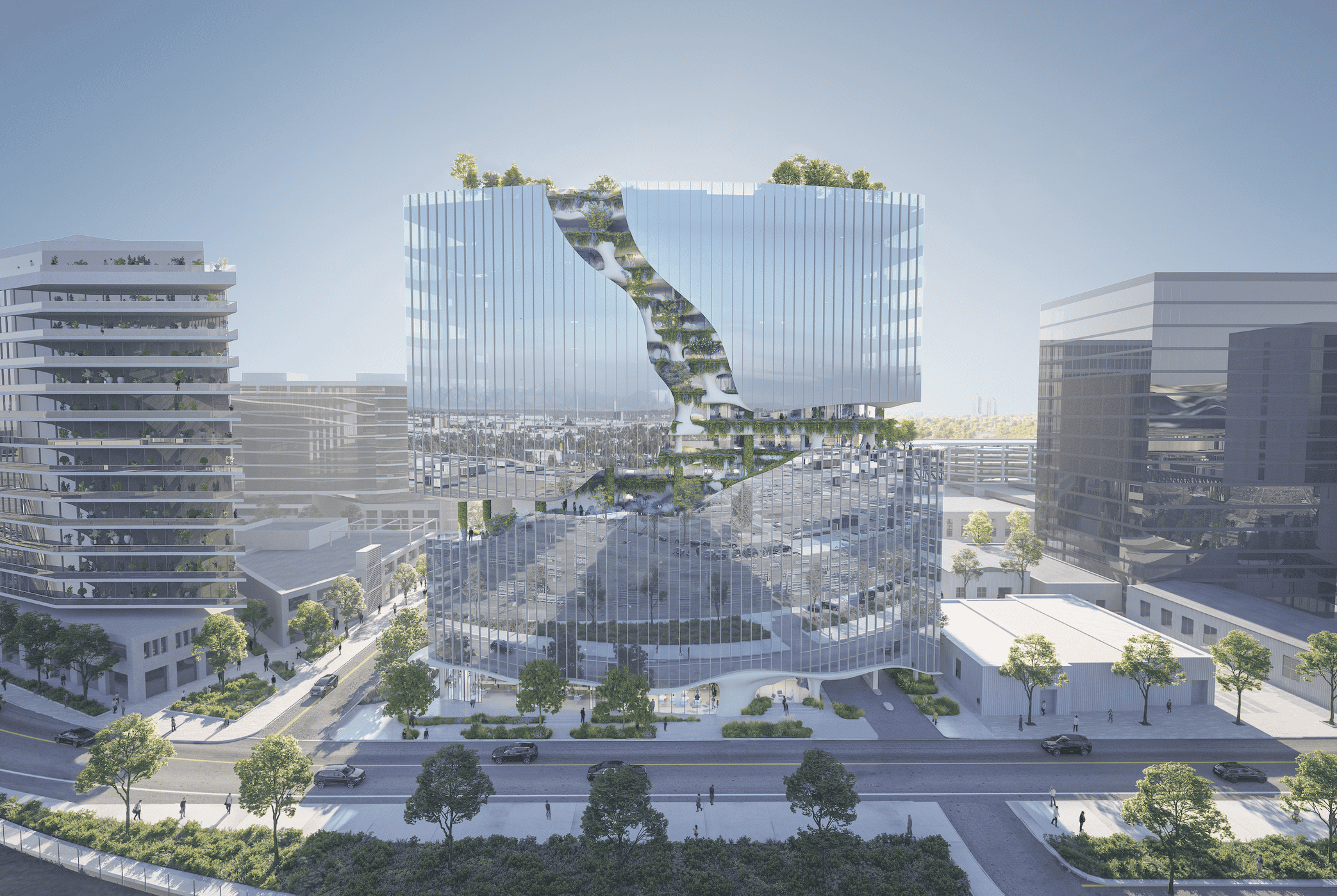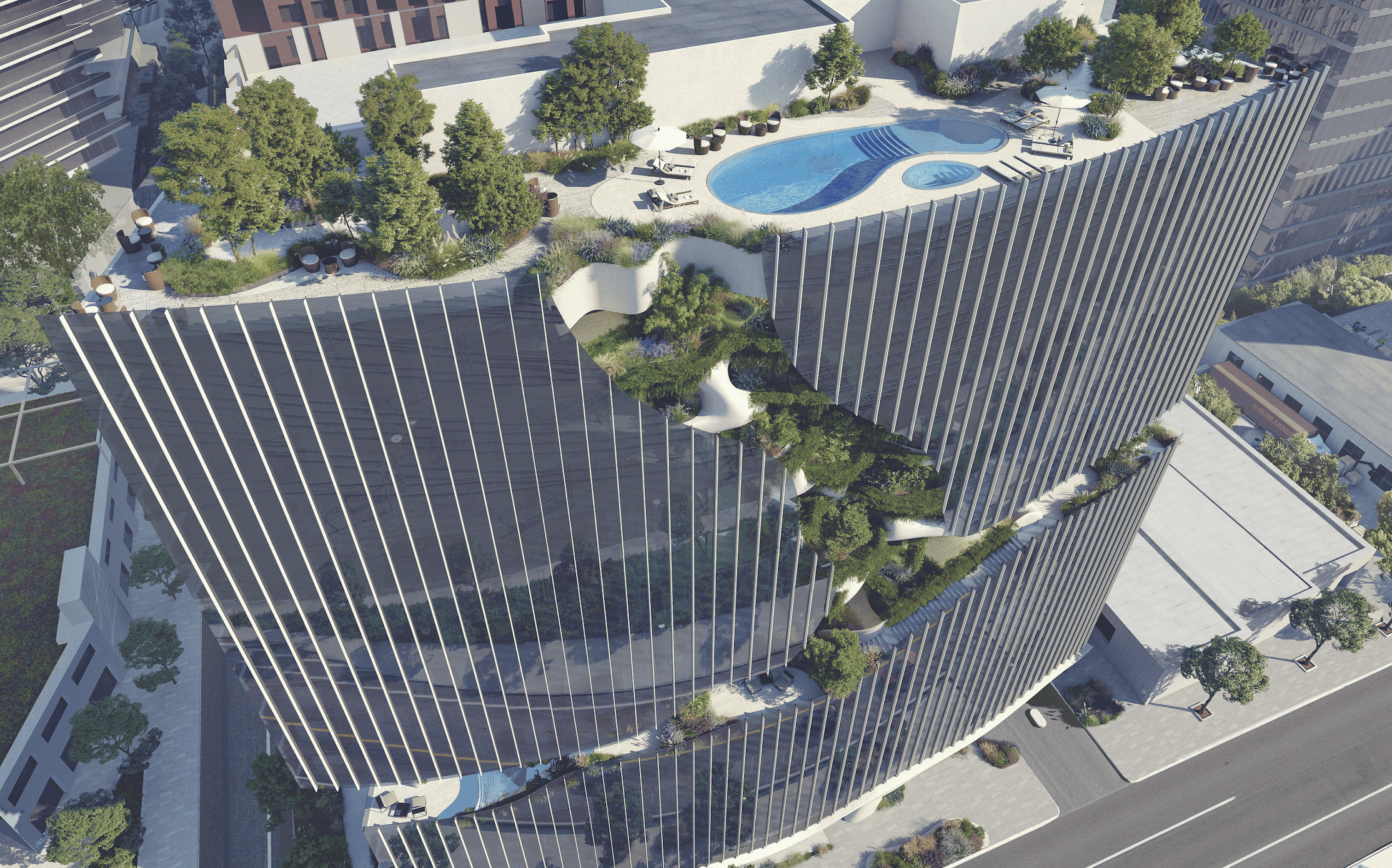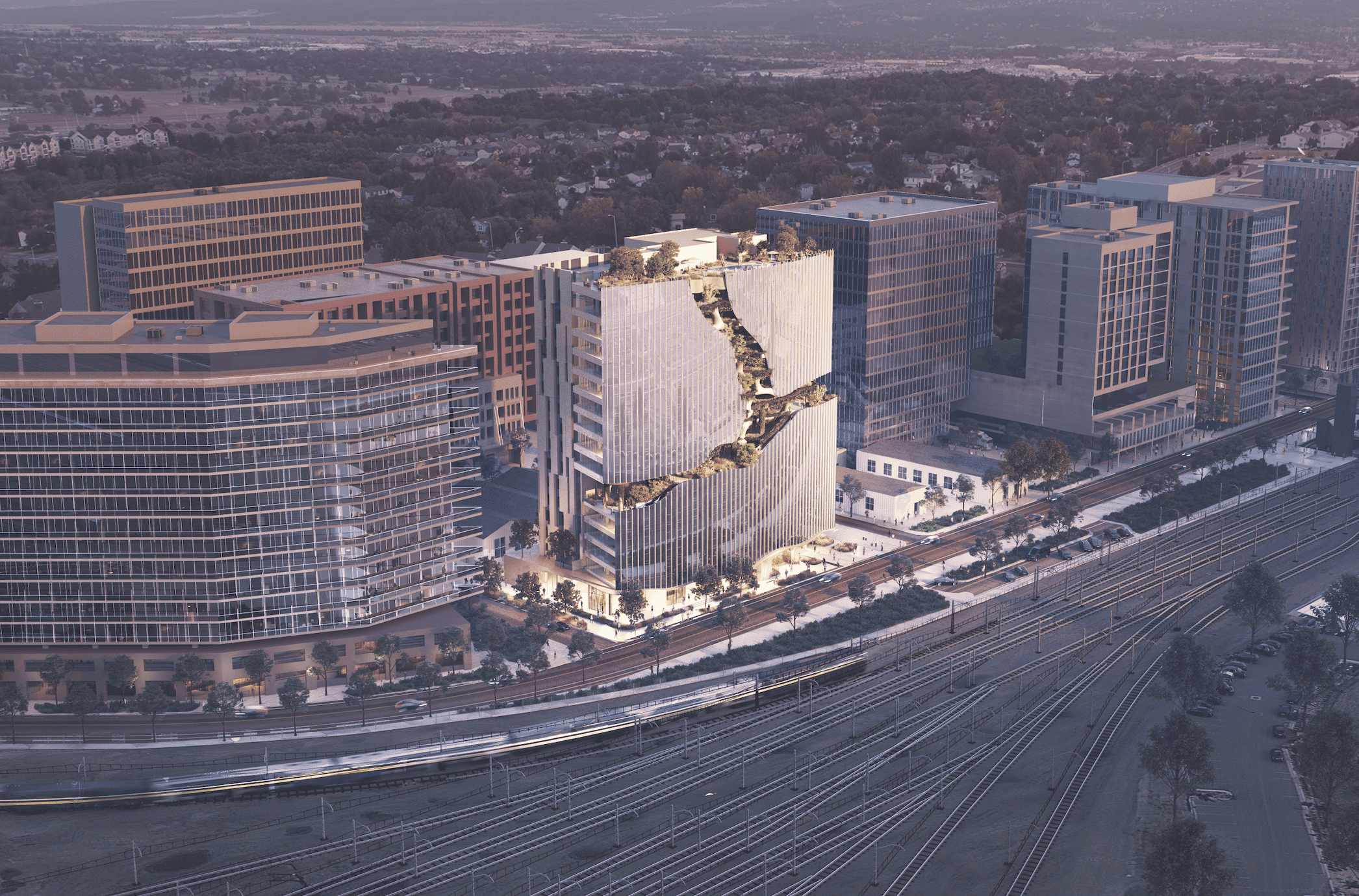Solutions Oriented
Pamela Conrad is Changing the Way the Industry Combats Climate Change
In a world with artificial intelligence, people are often suspicious of renderings that look like this. To some, the organic forms and divergent conditions for plant life seem like clues indicative of an unfathomably costly or unusable design. Yet, as One River North residents soon will find out, this mold-breaking living landscape is more than just verifiably authentic. The existence of this biophilic Denver building symbolizes nature breaking through urbanism, technological progress in architecture and synergy between optimistic and experienced professionals.
The Max Collaborative, the developers behind One River North, viewed this project as an opportunity to go above and beyond. Placing themselves in the headspace of a future resident, they ventured to find a way to create a living environment connecting beyond the confines of the apartment space. This train of thought led them to MAD Architects, an international firm headquartered in Beijing, China, known for dynamic, biophilia-centered work.

 “I have always been inspired by [MAD Architects] and the organic nature of their architecture, the way they blur the line between built environments and nature,” says Kevin Ratner, co-founder and managing partner at The Max Collaborative. “People are generally happier when they are around nature. We chose MAD because we wanted to do an architecturally stunning, high-rise apartment complex, but other than that, we knew we would not need to give them much direction. We love what they do."
“I have always been inspired by [MAD Architects] and the organic nature of their architecture, the way they blur the line between built environments and nature,” says Kevin Ratner, co-founder and managing partner at The Max Collaborative. “People are generally happier when they are around nature. We chose MAD because we wanted to do an architecturally stunning, high-rise apartment complex, but other than that, we knew we would not need to give them much direction. We love what they do."
After completing the first phase of the design and architectural massing process, The Max Collaborative brought on Davis Partnership, a multi-disciplinary architectural corporation based in Denver, to assess if the concept was technically viable. Overall, it was. Aside from some curvature tweaks, location-based enhancements to the narrative and a revised plant palette echoing the Colorado wilderness, much of the original creative work carried through the remainder of the project.
“The concept was strong, and our initial focus was simply to educate the owner and design architect as to what this green space would be relative to some of those early renderings,” says Jeff Stoecklein, senior landscape architect at Davis Partnership. “When you look at Denver, the city is sandwiched between a lot of different biomes or natural ecosystems. We leveraged that. Subtle moves occurred throughout the design process where Davis Partnership expressed that to get the effect of landscape that we were looking for, we needed to play with things like the wall forms and soil depths.”
From the 6th floor up, the canyon-like rift lines follow the environmental transitions experienced backpacking from Colorado prairies to alpine meadows. Each floor has two private balconies, and none look the same. The outdoor space is set to impress visitors, season by season, year by year, despite challenges like waterproofing, irrigation, craning specimen trees into place or the northwestern orientation of the facade.

“We had to get very detailed in our solar analysis before we selected any plants,” says Jeff. “Some communal areas are recessed 20 feet behind the building facade and getting pure shade. Other parts of that deck may get four to six hours of sunlight. It was important to look at each plant location in that solar analysis. Then, maybe equally important, was recognizing the unknown. We know, because of the building mass and all those curvilinear plaster forms that you see in the rift, that the canyon will experience wind tunnels and a variety of microclimates. Because of that, we were very clear with ownership that some plant mortality may occur. It is just the nature of what we do, but it may be at a higher rate here based on these factors.”


(Left) Exterior; (Right) Rooftop Deck
Irrespective of the vexing plant survival odds, Davis Partnership was committed to providing the clients with the resources needed to foster and maintain this resilient intensive-assembly landscape. They discussed long-term budget considerations (irrigation inspection, soil moisture checks, seasonal soil sample tests, etc.) to smooth out any post-installation issues and bolster the health of the green space. Jeff then consulted a third-party green roof professional and a Colorado State University horticulture professor to perform extensive reviews on the project. Soon, with the help of the same CSU professor, the green roof professional and a Davis Partnership irrigation designer, the team will create a final plant maintenance plan the owners of One River North can pass on to any landscape maintenance teams they work with in the future.
Greenery is not the only aspect of this canyon worth remarking about. Even though it came together swimmingly in the end, the structure was a sticking point for Kevin from The Max Collaborative in his effort to assemble a phenomenal, experienced and enthusiastic team.

“If you show a contractor rendering of this building, they will either think ‘no way’ or ‘that is going to cost a lot of money,’” says Kevin.
“We had to go through a demystification process. We would explain that beyond some exceptions, most of the techniques and materials needed were very traditional.’”
Joining the One River North team during the first of two preconstruction years, Dan Tuttle, senior project manager at Saunders Construction, brought with him over 15 years of experience and an excitement to take on new challenges. While he admits to some skeptical thoughts before his involvement, his vigor for the project now points to how advanced, collaborative and thorough the process was.
“We used a lot of 3D laser scanning on this project,” says Dan. “It is some of the most up-to-date laser scanning technology available, and we used it for quality control on the concrete planter walls that undulated up, down and sideways. You can scan the concrete walls with an iPad or a drone. Before, it took 24 to 48 hours for someone to stitch the data together and tell you where you went wrong. Now you can compare that laser model to the architect model within an hour.”

Jeff tells us this project would have been impossible without software like Rhino and Revit. These tools allow for more curving forms and quick, accurate handoffs from architect to landscape architect to project manager. Dan explains that this precision and communication between team members made implementing unusual installation techniques, like the One River North plaster chip system, only moderately challenging.
 “The plaster system is what gives the canyon that organic shape,” says Dan. “We call it the chip system. The reason is that the squares look like potato chips when they arrive. The chips are five-by-five squares of chicken wire, tie wire and a pencil rod, and they come in all these funky shapes. Each chip has a number on it. You piece them together in the field. That is also how you build the rocks at Disneyland.”
“The plaster system is what gives the canyon that organic shape,” says Dan. “We call it the chip system. The reason is that the squares look like potato chips when they arrive. The chips are five-by-five squares of chicken wire, tie wire and a pencil rod, and they come in all these funky shapes. Each chip has a number on it. You piece them together in the field. That is also how you build the rocks at Disneyland.”
One River North exemplifies the adage "If there's a will, there's a way." In this context, however, it is more fitting to say, "If there's a will and an experienced team of professionals committed to overcoming challenges, a viable solution is likely." Expertise in roofing top decking materials (pavers, pedestals and waterproofing systems), horticulture, warranties and building codes were instrumental in the implementation phase. On a fundamental level, however, the ache to try something new was what triggered the domino effect that led to this bold new addition to the Denver skyline.

Photo Credits
©One River North (Renderings), ©Davis Partnership (Renderings), ©Kairoi
Marvin Roca Jr., PR for The Max Collaborative
Email: marvin@therosegrp.com
MAD Architects, Saunders Construction, Davis Partnership, The Max Collaborative, Uplands Real Estate Partners, Wynne Yasmer Real Estate and Zakhem Real Estate Group
.png)
Pamela Conrad is Changing the Way the Industry Combats Climate Change
.png)
Five Edging Options To Use For Your Next Landscaping Job Oly-Ola Edging The Edging Experts” has produced commercial-grade, 100 percent...